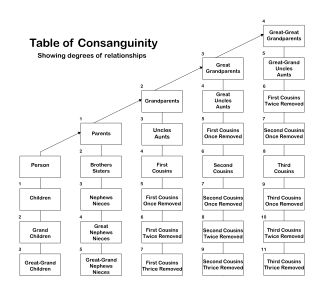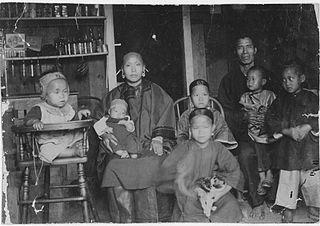Related Research Articles
Incest is human sexual activity between family members or close relatives. This typically includes sexual activity between people in consanguinity, and sometimes those related by affinity, adoption, or lineage. It is strictly forbidden and considered immoral in most societies, and can lead to an increased risk of genetic disorders in children.

A family tree, also called a genealogy or a pedigree chart, is a chart representing family relationships in a conventional tree structure. More detailed family trees, used in medicine and social work, are known as genograms.

Intestacy is the condition of the estate of a person who dies without having in force a valid will or other binding declaration. Alternatively this may also apply where a will or declaration has been made, but only applies to part of the estate; the remaining estate forms the "intestate estate". Intestacy law, also referred to as the law of descent and distribution, refers to the body of law that determines who is entitled to the property from the estate under the rules of inheritance.
A sibling is a relative that shares at least one parent with the subject. A male sibling is a brother and a female sibling is a sister. A person with no siblings is an only child.

In various cultures, a middlename is a portion of a personal name that is written between the person's first given name and their surname. A middle name is often abbreviated and is then called middle initial or just initial.

Consanguinity is the characteristic of having a kinship with a relative who is descended from a common ancestor.

Cheek kissing is a ritual or social kissing gesture to indicate friendship, family relationship, perform a greeting, to confer congratulations, to comfort someone, or to show respect.

A namesake is a person, geographic location, or other entity bearing the name of another.
An honorific is a title that conveys esteem, courtesy, or respect for position or rank when used in addressing or referring to a person. Sometimes, the term "honorific" is used in a more specific sense to refer to an honorary academic title. It is also often conflated with systems of honorific speech in linguistics, which are grammatical or morphological ways of encoding the relative social status of speakers. Honorifics can be used as prefixes or suffixes depending on the appropriate occasion and presentation in accordance with style and customs.

In Catholic canon law, affinity is an impediment to marriage of a couple due to the relationship which either party has as a result of a kinship relationship created by another marriage or as a result of extramarital intercourse. The relationships that give rise to the impediment have varied over time. Marriages and sexual relations between people in an affinity relationship are regarded as incest.

A cousin is a relative that is the child of a parent's sibling, this is more specifically referred to as a first cousin.
A person's next of kin (NOK) may be that person's spouse, adopted family member or closest living blood relative. Some countries, such as the United States, have a legal definition of "next of kin". In other countries, such as the United Kingdom, "next of kin" may have no legal definition and may not necessarily refer to blood relatives at all.

The Chinese kinship system is among the most complicated of all the world's kinship systems. It maintains a specific designation for almost every member's kin based on their generation, lineage, relative age, and gender. The traditional system was agnatic. based on patriarchal power, patrilocal residence, and descent through the male line. Although there has been much change in China over the last century, especially after 1949, there has also been substantial continuity.
Article 809 of the Korean Civil Code was the codification of a traditional rule prohibiting marriage between men and women who have the same surname resulting from belonging to the same clan and possessing the same genealogical patriline and sharing the same ancestral home (bon-gwan). On 16 July 1997, the Constitutional Court of Korea ruled the article unconstitutional. The National Assembly of South Korea passed an amendment to the Article in March 2002, which came into force on 31 March 2005, and prohibited marriage only between men and women who are closely related.
A cousin marriage is a marriage where the spouses are cousins. The practice was common in earlier times and continues to be common in some societies today, though in some jurisdictions such marriages are prohibited. Worldwide, more than 10% of marriages are between first or second cousins. Cousin marriage is an important topic in anthropology and alliance theory.
In law, a prohibited degree of kinship refers to a degree of consanguinity, or sometimes affinity between persons that makes sex or marriage between them being illegal.

Family is a group of people related either by consanguinity or affinity. It forms the basis for social order. The purpose of the family is to maintain the well-being of its members and of society. Ideally, families offer predictability, structure, and safety as members mature and learn to participate in the community. Historically, most human societies use family as the primary locus of attachment, nurturance, and socialization.
Laws regarding incest vary considerably between jurisdictions, and depend on the type of sexual activity and the nature of the family relationship of the parties involved, as well as the age and sex of the parties. Besides legal prohibitions, at least some forms of incest are also socially taboo or frowned upon in most cultures around the world.

In the law of inheritance, a laughing heir is an heir who is legally entitled to inherit the property of a person who has died, even though that heir is only distantly related to the deceased, and therefore has no personal connection or reason to feel bereaved over the death.
A second-degree relative (SDR) is someone who shares 25% of a person's genes. It includes uncles, aunts, nephews, nieces, grandparents, grandchildren, half-siblings, and double cousins.
References
- ↑ Talley, Nicholas (2007). Gastroenterology and Hepatology: A Clinical Handbook. p. 200.
- ↑ Reiss, David (1981). The Family's Construction of Reality . p. 276. ISBN 9780674294158.
- ↑ Ginsburg, Geoffrey (2008). Genomic and Personalized Medicine, Volumes 1-2. p. 482.